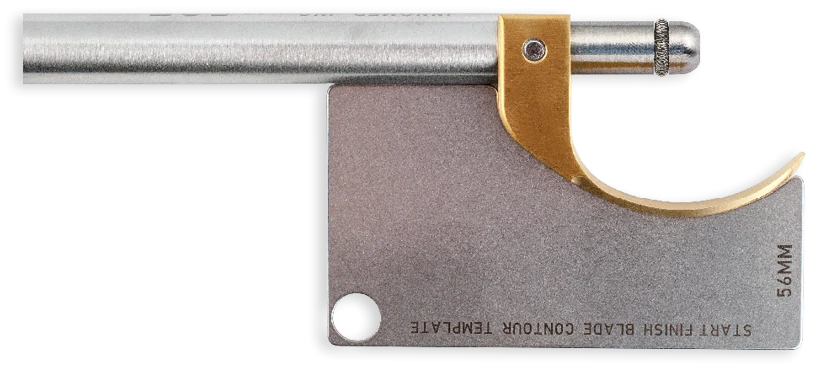
Photo courtesy of Bal Seal Engineering
When a medical device is profitable, popular, selling well, and meeting all regulatory requirements, it can be tempting to leave well enough alone and focus on new product development instead of improving existing lines through iterative changes.
At Innomed Inc., a Savannah, Georgia-based manufacturer of surgical instruments for orthopedic surgery, founder and president Jim Anderson takes seriously the company’s commitment to continuous improvement. Innomed recently rolled out two revised products to prevent cleanability issues and stay ahead of regulatory guidelines.
Innomed uses ball plungers and ball-and-spring designs with blind holes in its products. Many of those products are designed by orthopedic surgeons to facilitate or expedite specific tasks, and Innomed aspires to foster new and ongoing relationships with surgeons to develop and originate innovative products. Seeking to eliminate – or at least minimize – the inherent potential for contamination in reusable instruments, Innomed began investigating alternative locking mechanisms for two of its best-selling interchangeable instruments – the CupX Acetabular Cup Extraction System and the Kolbel Self-Retaining Glenoid Retractor.
Those very different products – one is used for hip revision surgery, the other retracts soft tissue during shoulder surgery – were improved with Bal Spring canted coil springs made by Foothill Ranch, California-based Bal Seal Engineering Inc.
Canted coil spring
In 2015, Jim Anderson approached Innomed’s manufacturing partner, Warsaw, Indiana-based Instrumental Machine & Development Inc. (IMD), seeking a solution that could replace the ball plunger in the CupX and the Kolbel without requiring instrument redesign.
Innomed and IMD began investigating alternatives with comparable mechanical holding capability and superior cleanability. While both products have been on the market for years with no complaints about contamination, Innomed was committed to upgrading the instruments so they could be cleaned with no chance of contamination. With the Kolbel, the system would have to accommodate all existing legacy instruments sold throughout the years.
IMD product engineers worked with the engineers at Bal Seal Engineering to consider solutions based on features that could not change, and those that could be slightly modified, as well as the insertion and removal force requirements. The recommendation was a customized version of its canted coil spring. After prototyping, it was an immediate success in both instruments.
The Kolbel with a Bal Seal Engineering- developed retaining spring was introduced to market in December 2016. The updated CupX was introduced in January 2017.
Joe Beard, prototype/engineering manager at IMD says, “Bal Seal Engineering worked with us to develop the correct spring and groove setup we needed. In the end, it yielded great results, and the collaboration allowed us to improve functionality while being proactive about cleanability.”


Cleanability
The U.S. Food and Drug Administration (FDA) has noted that inadequate reprocessing can result in the retention of biological debris or soil in certain types of reusable medical devices, allowing microbes to survive disinfection or sterilization.
The original CupX and Kolbel instruments met all FDA specifications for material, cleaning, and traceability, yet Innomed and IMD saw opportunities for improvement. The Bal Spring’s ability to withstand repeated cleaning and sterilization processes made it attractive. An independent test report released in 2017 (Cleaning Evaluation R&D Report, test report for Bal Seal Engineering, Nelson Laboratories, May 12, 2017) proved that a sampling of Bal Spring canted coil springs were cleanable and reusable, meeting medical device industry standards as well as FDA regulations.
Conducted under worst-case conditions, testing validated that a device containing a canted coil spring in various groove geometries can be properly cleaned with manual or automated processes, withstanding stringent cleaning methods from manual scrubbing to automated dishwasher systems.
Conclusion
Innomed and IMD are committed to continuous product improvement, meeting or exceeding FDA regulations, and preventing issues before they occur. Because of questions about the cleanliness of the blind hole on the back side of the ball and spring setup in two surgical instruments, the designs were enhanced with Bal Spring canted coil springs, and IMD and Innomed are applying similar design concepts in developing other instruments.
Innomed says it is committed to a quality management system that endeavors “to consistently meet or exceed customer and regulatory requirements and expectations” and “to focus on exceptional customer service, quality products, and continuous improvement.”
With its integration of the Bal Spring canted coil spring in the CupX Acetabular Cup Extraction System and Kolbel Self-Retaining Glenoid Retractor, the company seems intent on fulfilling its promise.
Bal Seal Engineering Inc.
www.balseal.com
Innomed Inc.
www.innomed.net
Instrumental Machine & Development Inc. (IMD)
www.imdortho.com
About the author: David Wang is a global market manager for Bal Seal Engineering’s medical device business. An engineer with more than 10 years of design experience, he collaborates with OEMs and tier suppliers to create sealing, connecting, conducting, and EMI shielding solutions that help set new standards for device performance. Wang can be reached at 949.460.2147 or dwang@balseal.com.
Latest from Today's Medical Developments
- Arcline to sell Medical Manufacturing Technologies to Perimeter Solutions
- Decline in German machine tool orders bottoming out
- Analysis, trends, and forecasts for the future of additive manufacturing
- BlueForge Alliance Webinar Series Part III: Integrate Nationally, Catalyze Locally
- Robot orders accelerate in Q3
- Pro Shrink TubeChiller makes shrink-fit tool holding safer, easier
- Revolutionizing biocompatibility: The role of amnion in next-generation medical devices
- #56 Lunch + Learn Podcast with Techman Robot + AMET Inc.





